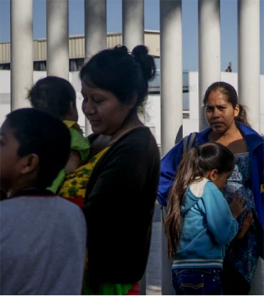US, UK double down on hostile asylum policies
The US and UK are both implementing draconian changes to asylum and migration arrangements as the dual deadlines approach for the transition of power to the Biden administration and Brexit.
In the US, the Trump administration has finalised a new migration regulation which has been dubbed the ‘death to asylum’ rule despite burgeoning criticism of it.
 The rule, to be introduced on January 10, creates insurmountable procedural barriers, evidentiary burdens, and qualification standards that will particularly affect asylum claims by Central Americans fleeing gang violence; women and others fleeing domestic abuse; and people fleeing persecution on the basis of sexual orientation or gender identity.
The rule, to be introduced on January 10, creates insurmountable procedural barriers, evidentiary burdens, and qualification standards that will particularly affect asylum claims by Central Americans fleeing gang violence; women and others fleeing domestic abuse; and people fleeing persecution on the basis of sexual orientation or gender identity.
The rule also establishes barriers that will make it more difficult for all people claiming asylum to be recognised as refugees and protected.
It introduces new definitions of fundamental asylum concepts will exclude from protection many people.
Under the rule, “political opinion” as the basis of an asylum claim now must be in support of “a discrete cause related to political control of a state.”
And “membership in a particular social group” as grounds for asylum will now explicitly exclude gender and a list of other characteristics and situations.
The term “persecution” will now require “the infliction of a severe level of harm… so severe that they constitute an exigent threat”.
Human rights activists say to qualify, applicants will essentially need to show a gun was held to their heads.
President-elect Joe Biden can undo this regulation, but unless Congress formally disapproves of it within 60 legislative working days, his administration will have to issue new regulations, which will take more time to take effect.
Meanwhile, in the UK a new review of the Human Rights Act could limit judges’ powers to block deportations.
UK Justice Secretary Robert Buckland said the review would look at several key areas – including whether judges have been ‘unduly drawn’ into Government policy and law.
Another area of the review will establish whether judges’ interpretations of past legal decisions in European case law should be limited when looking at current cases.
Critics have claimed focusing on old cases can lead to ‘gold-plating’ the UK’s current human rights duties.
A separate review of asylum will look at reducing the number of people using Article 3 of the Human Rights act – freedom from torture and inhuman or degrading treatment.
This would prevent foreign criminals from making false claims about their treatment in their home country – and could see hundreds more deportations per year.
Writing in UK media, Mr Buckland said: ‘The Human Rights Act (HRA) was enacted to give further domestic effect to the protections in the European Convention on Human Rights (ECHR), thereby reducing the need for people in the UK to take their cases to the European Court of Human Rights in Strasbourg.’
Last week the UK Home Office was blocked from deporting 23 criminals to Jamaica after 11th-hour legal challenges backed by Labour MPs and celebrities.
It comes as the Home Office faces a fresh deportation row with lawyers seek to block the removal of migrants who have crossed the English Channel.
Migrants from countries including Sudan are due to be flown to Germany, Spain and France on four charter flights.
Under EU rules migrants who have already claimed refugee status in another EU country can be returned there.
But campaigners say they include suspected victims of trafficking and forced labour.
Activists have accused the Government of ‘a complete disregard for human life’ and of ‘rushing’ ahead with the removals ahead of Brexit.
Lawyers acting for the asylum seekers set to be deported this week say they have not been asked two key questions – ‘Why have you come to the UK?’ and ‘Please outline your journey to the UK’ – which are intended to identify vulnerabilities.
An interim high court ruling last month ordered the Home Office to reinstate the two questions.












